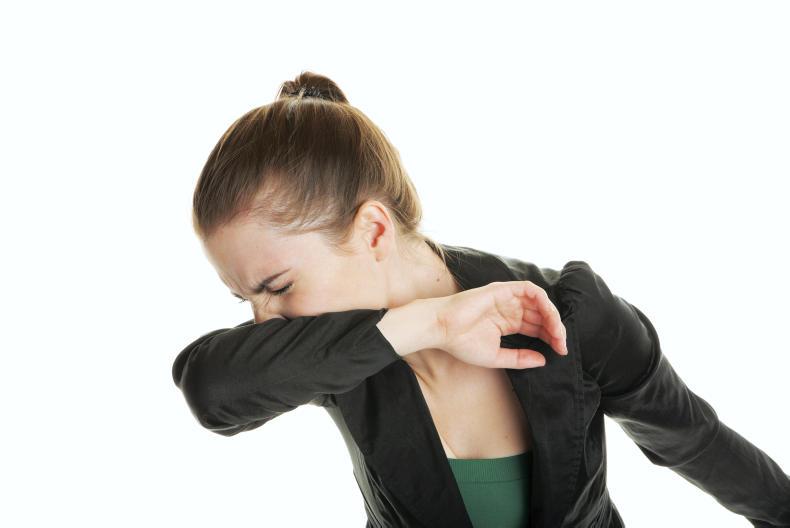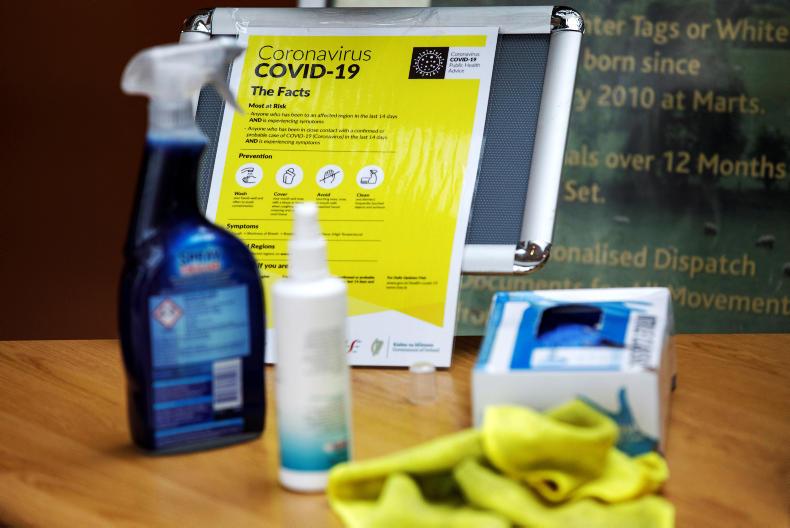The HSE is issuing advice on a regular basis in relation to the new respiratory illness coronavirus (Covid-19).
This should be heeded in order to stop the spread of the virus as much as possible. Remember that it can take up to 14 days for the symptoms of coronavirus to appear and those symptoms include:
A cough.Shortness of breath.Breathing difficulties.Fever (high temperature).The coronavirus can also cause more severe illness, including:
Pneumonia.Severe acute respiratory syndrome.Kidney failure.You will only need to be tested for coronavirus if you have symptoms and have in the last 14 days been:
In close contact with a confirmed case of coronavirus.To a country or region with a spread of coronavirus.In a healthcare centre or hospital where patients with coronavirus were being treated.If your doctor thinks that you need a test for coronavirus, they will tell you where the test will be done and when to expect your results.
Anyone who knows they have been in close contact with a confirmed case in the last 14 days and has symptoms (cough, shortness of breath, fever) should:
Isolate themselves from other people. This means going into a different, well-ventilated room, with a phone.Phone their GP, or emergency department – if this is not possible, phone 112 or 999.In a medical emergency (if you have severe symptoms), phone 112 or 999.Close contact means either:
Face-to-face contact.Spending more than 15 minutes within two metres of an infected person.Living in the same house as an infected person.How does it spread?
Coronavirus is spread in sneeze or cough droplets.
You could get the virus if you:
Come into close contact with someone who has the virus and is coughing or sneezing.Touch surfaces that someone who has the virus has coughed or sneezed on.Simple household disinfectants can kill the virus on surfaces. Clean the surface first and then use a disinfectant.To protect yourself:
Wash your hands properly and regularly with soap and water or an alcohol-based hand rub.
Sneezing into a sleeve can prevent spreading of germs.
Cover your mouth and nose with a tissue or your sleeve when you cough or sneeze.Put used tissues into a bin and wash your hands.Clean and disinfect frequently touched objects and surfaces.Follow the travel advice from the Department of Foreign Affairs if travelling to a country or region with a spread of coronavirus.Surgical face masks
Don’t use a surgical face mask if you feel well and do not have symptoms – there’s no evidence that using masks is of any benefit if you are not sick.
You should use a face mask if you:
Have or may have coronavirus.Are in close contact with someone who has or may have coronavirus.Are a healthcare worker in close contact with people who may have or have coronavirus.Treatment
There is no specific treatment for coronavirus, but many of the symptoms of the virus can be treated.
If you get the virus, your healthcare professional will advise treatment based on your symptoms.
Antibiotics do not work against coronavirus or any viruses. They only work against bacterial infections.
There is currently no vaccine to treat or protect against coronavirus.
While figures are as yet unclear, it is currently believed that 1% to 2% of those who got the virus have died, with those over 80 years of age and ill among the most affected.
It is likely you are more at risk if you catch coronavirus and:
Are 65 years of age and over.Have a long-term medical condition, for example heart disease.See the HSE website for regular advice updates.
Read more
Coronavirus: latest farming, mart and price updates as they happen
Tips on how contractors can help stop the spread of Covid-19
The HSE is issuing advice on a regular basis in relation to the new respiratory illness coronavirus (Covid-19).
This should be heeded in order to stop the spread of the virus as much as possible. Remember that it can take up to 14 days for the symptoms of coronavirus to appear and those symptoms include:
A cough.Shortness of breath.Breathing difficulties.Fever (high temperature).The coronavirus can also cause more severe illness, including:
Pneumonia.Severe acute respiratory syndrome.Kidney failure.You will only need to be tested for coronavirus if you have symptoms and have in the last 14 days been:
In close contact with a confirmed case of coronavirus.To a country or region with a spread of coronavirus.In a healthcare centre or hospital where patients with coronavirus were being treated.If your doctor thinks that you need a test for coronavirus, they will tell you where the test will be done and when to expect your results.
Anyone who knows they have been in close contact with a confirmed case in the last 14 days and has symptoms (cough, shortness of breath, fever) should:
Isolate themselves from other people. This means going into a different, well-ventilated room, with a phone.Phone their GP, or emergency department – if this is not possible, phone 112 or 999.In a medical emergency (if you have severe symptoms), phone 112 or 999.Close contact means either:
Face-to-face contact.Spending more than 15 minutes within two metres of an infected person.Living in the same house as an infected person.How does it spread?
Coronavirus is spread in sneeze or cough droplets.
You could get the virus if you:
Come into close contact with someone who has the virus and is coughing or sneezing.Touch surfaces that someone who has the virus has coughed or sneezed on.Simple household disinfectants can kill the virus on surfaces. Clean the surface first and then use a disinfectant.To protect yourself:
Wash your hands properly and regularly with soap and water or an alcohol-based hand rub.
Sneezing into a sleeve can prevent spreading of germs.
Cover your mouth and nose with a tissue or your sleeve when you cough or sneeze.Put used tissues into a bin and wash your hands.Clean and disinfect frequently touched objects and surfaces.Follow the travel advice from the Department of Foreign Affairs if travelling to a country or region with a spread of coronavirus.Surgical face masks
Don’t use a surgical face mask if you feel well and do not have symptoms – there’s no evidence that using masks is of any benefit if you are not sick.
You should use a face mask if you:
Have or may have coronavirus.Are in close contact with someone who has or may have coronavirus.Are a healthcare worker in close contact with people who may have or have coronavirus.Treatment
There is no specific treatment for coronavirus, but many of the symptoms of the virus can be treated.
If you get the virus, your healthcare professional will advise treatment based on your symptoms.
Antibiotics do not work against coronavirus or any viruses. They only work against bacterial infections.
There is currently no vaccine to treat or protect against coronavirus.
While figures are as yet unclear, it is currently believed that 1% to 2% of those who got the virus have died, with those over 80 years of age and ill among the most affected.
It is likely you are more at risk if you catch coronavirus and:
Are 65 years of age and over.Have a long-term medical condition, for example heart disease.See the HSE website for regular advice updates.
Read more
Coronavirus: latest farming, mart and price updates as they happen
Tips on how contractors can help stop the spread of Covid-19






SHARING OPTIONS